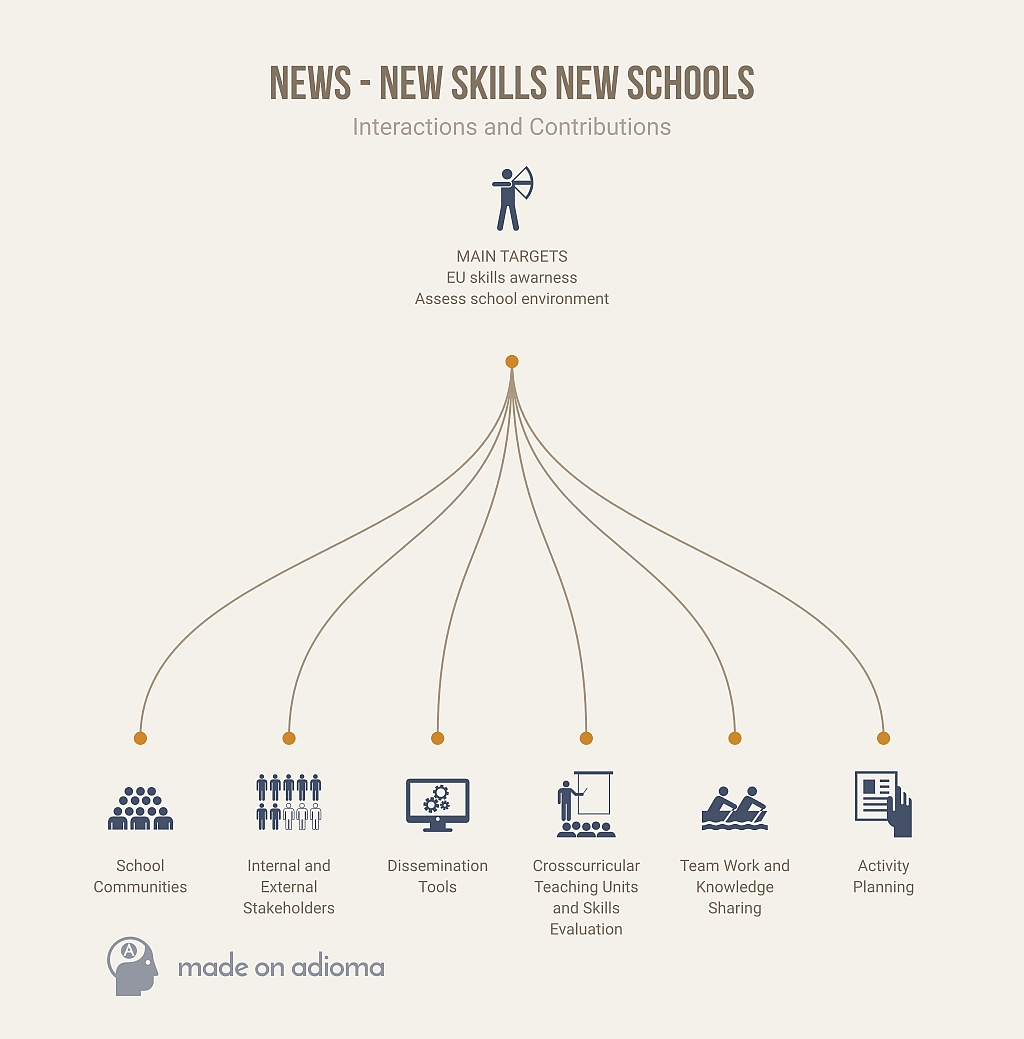PROJECT KIT
"NewS - New Skills New Schools" aims at evaluating school environments in order to measure to what extent they promote the Key European Skills, it also contributes to increase awarness about skill development.
- Type of Partnership: Public schools from 1st to 10th grades from different EU member countries.
- Number of suggested partners: from 5 to 7
- Funding Program: ERASMUS+ K2 Strategic Partnerships between schools
- People involved in Mobilities: teachers (occasionally pupils)
- Main Evaluation Tool: S.A.T. School Assessment Tool (clic here to download)
- Planned Surveys inside the schools: Questionnaire #1 (on Active Citizenship) - Questionnaire #2 (on European Awarness) - Questionnaire #3 (on Learning to Learn) - Questionnaire #4 (on Teachers & Students' motivation & perception concerning the Project) - Questionnaire #5 (on the Level of Involvement of all Stakeholders) - Questionnaire #6 (on CLIL and introduction of other Innovative Approaches). Surveys are scheduled once a year (please check the Prokject Timeline at the link below) and they aim at collecting data to better clarify some aspects in the S.A.T. evaluation.
- Timeline or GANTT

- Platforms used: multilingual Project Blog and eTwinning.
Project Summary
This Project aims at gathering the best Europe-oriented practices about skills development, curricular methodologies, compulsory subjects and their integration with Formal, Non-Formal and Informal abilities according to European guidelines. These competences, which combine knowledge and skills indispensable for life in the 21st Century, include social and interpersonal skills, sense of initiative, experience-based tasks, ICT literacy, multicultural abilities, multilingual proficiency and learning-to-learn attitude. They are considered interdependent with emphasis on critical thinking, creativity and problem solving. The fact that all partner schools have grades framed into the "Compulsory Education" will help teachers observing the current state of compulsory programs, their flexibility and routes in the flow of the European guidelines. The main target groups are teachers, students (8-12 y.o.) and school communities.
Our team identified the key working-areas to trigger positive activities and observations:
- Teachers' mindset, background and approach-evolution according to the 21st century education requirements.
- Test the proper management (in the teaching/learning approach) of some basic skills and abilities: social, interpersonal, multicultural, spirit of initiative, learning-to-learn, experience-based tasks, ICT skills, foreign languages.
- Interaction of all the resources (internal and external) the school can count on to re-design the teaching/learning process.
- Involvement, awareness and interaction of the school community and all stakeholders: families, teachers, learners, extra-curricular project partners, local authorities, the Ministry of Education.
- Measure the gap between each education system and an "Ideal European Model" shared by the partners. There are national education systems that keep up with the European guidelines and others that are moving at a different pace in a European perspective. The exchange between schools will help us digging out these elements and declare them to improve an official EU Development Plan in each school.
According to the Report by the European Commission named "Rethinking Education: Investing in skills for better socio-economic outcomes" (2012): Member States should foster entrepreneurial skills through new and creative ways of Teaching and Learning from PRIMARY SCHOOL onwards, alongside a focus from SECONDARY to higher education on the opportunity of business creation as a career destination. Real world experience, through Problem-Based Learning and enterprise links, should be embedded across all disciplines and tailored to all levels of education.
The main evaluation tool will be the "SAT: School Assessment Tool", a Matrix (counting 168 descriptive indicators) especially designed to monitor the evolution of our education environments. SAT is not a way for assessing individual skills but for evaluating fit or unfit school environments where those skills can grow. This tool was thought not only to measure the ongoing results, but also to trigger debates and discussions (inside and outside our schools) about the development and the potential evaluation of Non Formal and Informal abilities in the Formal Educational context.
Infographic